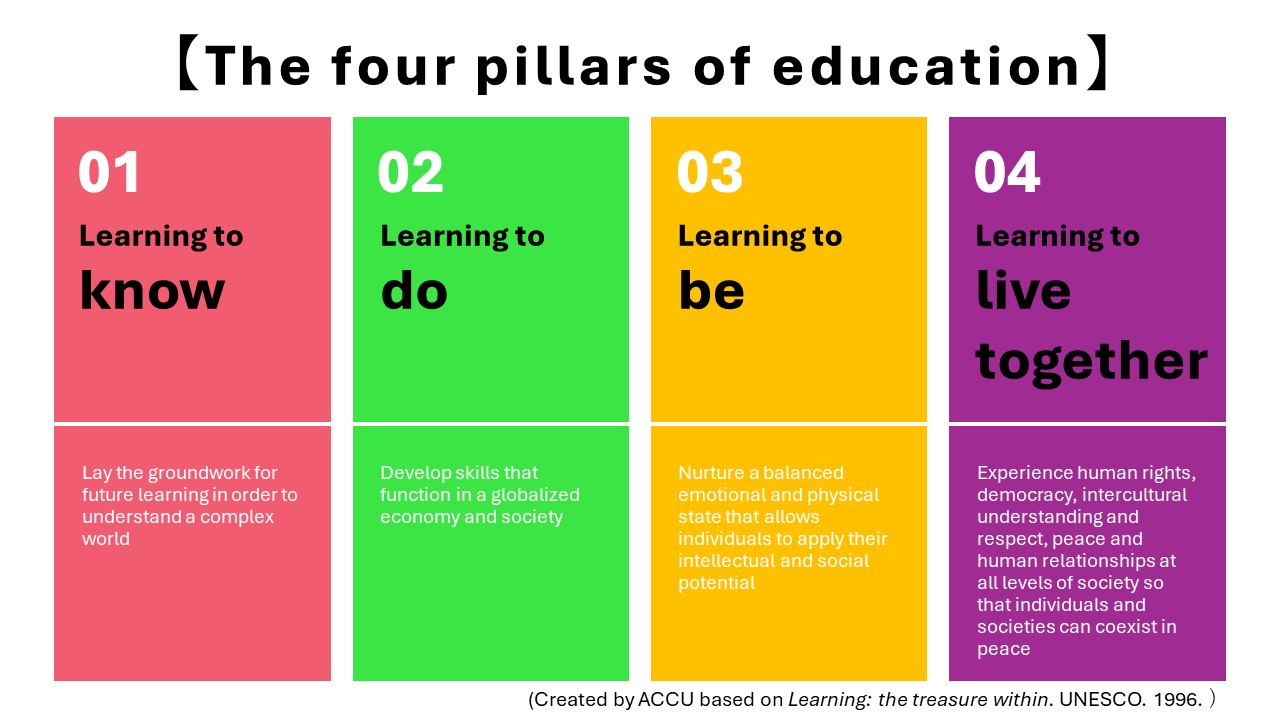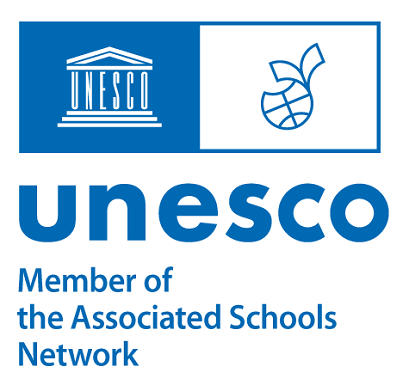“Since wars begin in the minds of men,
it is in the minds of men that the defences of peace must be constructed.”
The above statement is the preamble to the United Nations Educational, Scientific and Cultural Organization (UNESCO) Constitution established on 16 November 1945. Rooted in reflections on the Second World War, which marked the rise of racism and anti-Semitism, the constitution sought to bring people together and strengthen the intellectual and moral solidarity of humankind through mutual understanding and dialogue between cultures. This led to the establishment of UNESCO on 4 November 1946.
The Associated Schools Network (ASPnet) is an international network founded in 1953 to practically implement the ideals of UNESCO in schools. ASPnet aims to strengthen international cooperation and collaboration between member schools, promote knowledge sharing and partnerships amongst teachers and students, as well as build capacity for innovative teaching and participatory learning, particularly through whole-school approaches. At inception, ASPnet comprised 33 schools in 16 Member States. It has since grown to become one of the largest network of schools in the world, with more than 11,500 member schools in 182 countries.
A Historical Timeline of UNESCO ASPnet
In Japan, schools that have been granted ASPnet membership are referred to as “UNESCO Schools”. As of April 2024, UNESCO ASPnet in Japan comprised 1,088 pre-schools and childcare facilities, elementary schools, junior high schools, senior high schools, and teacher training colleges. These schools account for approximately 10% of the total number of ASPnet member schools worldwide and are involved in a wide variety of activities. Schools whose applications have been approved by the Japanese National Committee for UNESCO and are currently awaiting membership certification by the UNESCO headquarters, are referred to as “UNESCO ASPnet Candidate Schools” and are thus recognised as members of UNESCO ASPnet in Japan.
※For more information about “UNESCO ASPnet Candidate Schools”, refer to the statement on ASPnet’s latest developments (Japanese only) issued by the Assistant-Director General of International Affairs, Ministry of Education, Culture, Sports, Science and Technology (MEXT).
Mission
ASPnet aims to “construct the defences of peace in the minds” of students by instituting UNESCO’s values and objectives within the organization, lessons, projects, and policies of participating schools. It highlights the four pillars of education as advocated by UNESCO.

Objectives and Thematic Focus
Source: UNESCO Associated Schools Network: Guide for National Coordinators
- To promote the values and principles enshrined in the UNESCO Constitution and United Nations Charter, including fundamental rights, human dignity, gender equality, social progress, freedom, justice, democracy, respect for diversity, and international solidarity.
- To promote schools as “laboratories of ideas” that serve UNESCO’s mandates for education, science, culture, and communication. In doing so, ASPNnet fosters institutional and human capacities, contributes to the development of policies and setting of standards, and strengthens international and regional cooperation.
- To pioneer innovative and creative pedagogies that translate global concepts into practices at the school level, and to transform educational systems and policies.
- To foster cooperation, knowledge sharing, and partnerships among like-minded schools around the world as a global network.
- To contribute to the achievement of Sustainable Development Goals (SDGs) while providing opportunities for its members to develop a sense of belonging within the global community. ASPnet specifically focuses on Goal 4 (education), which draws on the following themes:
- Global citizenship and a culture of peace and non-violence
- Sustainable development and sustainable life styles
- Intercultural learning and the appreciation of cultural diversity and heritage
In accordance with the Ministry of Education, Culture, Sports, Science and Technology (MEXT) and the Japan National Commission for UNESCO, UNESCO ASPnet schools in Japan have been positioned as centres to promote Education for Sustainable Education (ESD). For details, refer to the official guidelines for UNESCO ASPnet schools (Official Notice /Text in Japanese) established in September 2012.
For more information about UNESCO and ESD in Japanese, visit the official Japan National Commission for UNESCO (Japanese only) website.
UNESCO ASPnet Membership Benefits
Source: UNESCO Associated Schools Network: Guide for Members
- Opportunities to connect and collaborate with partner schools domestically and globally.
- Opportunities for participation in international conferences, fora, and projects organised by UNESCO.
- Access to up-to-date thematic guidance, expert knowledge, and teaching and learning resources.
- Opportunities for participation in nationwide seminars, campaigns, competitions, etc. pertaining to UNESCO ASPnet.
- Receipt of support, guidance, and advice from the supporters of UNESCO ASPnet.
- Access to the Online Platform for ASPnet (OTA), whereby member schools can mutually share and view uploaded materials, photos, and videos.
- Authorization to use the “Member of the UNESCO Associated Schools” logo in accordance with the UNESCO ASPnet Logo Guidelines.

Eligibility for UNESCO ASPnet Membership・Conditions for Membership Renewal
ASPnet membership is open to all public or private schools and institutions that uphold and promote UNESCO’s values and principles. As such, both formal and non-formal institutions providing pre-primary, primary, secondary, post-secondary, technical or vocational education as well as teacher training are eligible to apply. While no membership fees or charges shall be incurred for the application, screening, certification, and renewal processes, member schools are expected to proactively perform the following set of tasks to display and keep their membership status:
- Submission of an annual work plan and report to the Japanese National Commission for UNESCO.
- Commemoration and celebration of at least two stipulated United Nations days per year through related activities.
- Proactive participation in activities implemented or proposed by UNESCO and the Japanese National Commission for UNESCO.
- Dissemination of information about UNESCO ASPnet activities both domestically and internationally.
For details, refer to the UNESCO Associated Schools Network: Guide for Members (English) /ユネスコスクール:メンバーズガイド(Provisional translation in Japanese) published by UNESCO.
※ In May 2021, MEXT issued a statement on ASPnet’s latest developments (Japanese only) in response to domestic and international changes pertaining to ESD. Said statement also sought to maintain quality in the operation and management of member schools.
